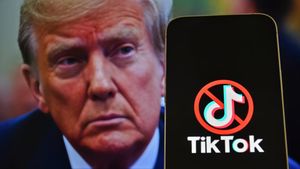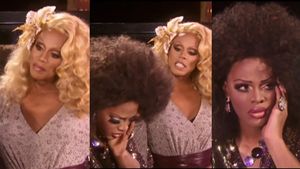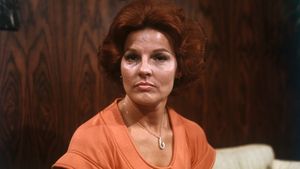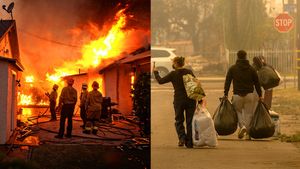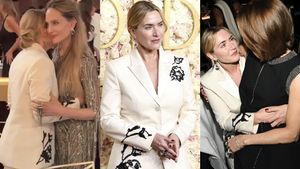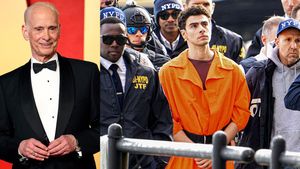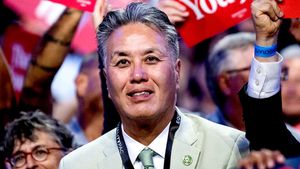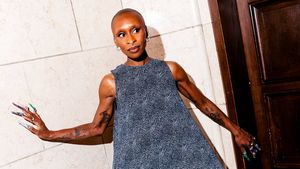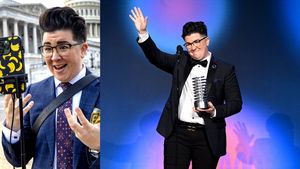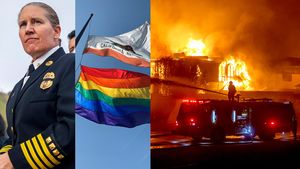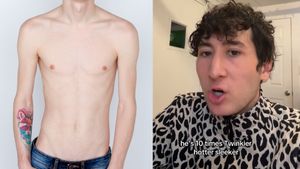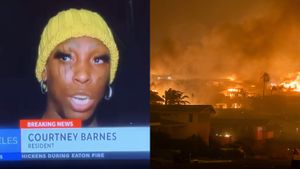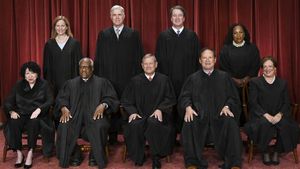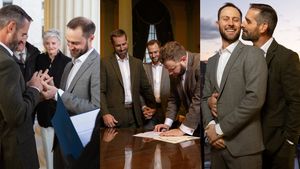
Treatment GuideJust DiagnosedSex & DatingAfrican AmericanStigmaAsk the HIV DocPrEP En EspañolNewsVoicesPrint IssueVideoOut 100
CONTACTCAREER OPPORTUNITIESADVERTISE WITH USPRIVACY POLICYPRIVACY PREFERENCESTERMS OF USELEGAL NOTICE
© 2025 Pride Publishing Inc.
All Rights reserved
All Rights reserved
By continuing to use our site, you agree to our Private Policy and Terms of Use.
Few musicians will ever experience the international renown that Scottish recording artist Annie Lennox has enjoyed, both as half of the iconic 1980s pop-rock duo Eurythmics and as a solo artist. In total she's sold over 80 million albums, making her one of the best-selling musicians ever. Now 56, the Oscar-winner, United Nations AIDS ambassador, and officer of the Order of the British Empire has turned her attention to full-time activism, campaigning on behalf of women and children around the world affected by HIV/AIDS. Lennox launched her SING Campaign in December 2007, born out of her participation in Nelson Mandela's 46664 campaign, a human rights effort that seeks education and health care for people with HIV/AIDS. She performed at the 2003 benefit concert for 46664 in South Africa, where she had one of her first confrontations with the enormous scope of the problem of AIDS. In her own words, Lennox details why she started SING after meeting Mandela, how she learned about the dire conditions of women and children, and how she keeps her spirits high in the face of a seemingly overwhelming problem. MEETING NELSON MANDELA 'We were taken up to one of his residences in Cape Town the day after we arrived [for the 2003 concert for 46664]. It was quite extraordinary to [Eurythmics band mate] Dave Stewart and me because we had been supporters in our own way of the anti-apartheid movement, and we had both been hugely affected in a very positive way by the fact that apartheid had been gotten rid of. It seemed the whole world celebrated the final last bastion of legitimized racism. '[Mandela] is such a significant person on the planet who seems to represent the right things, so to actually meet that person and to spend time with him was remarkable. But the thing that was more significant than meeting the man was his press conference at Robben Island. He gave an audience in the former prison yard standing in front of his former prison cell [his prisoner number at Robben Island was 46664], and it truly was a turning point for me, an extraordinary moment. He was talking about the HIV/AIDS pandemic, and especially how it affected women and girls, and it struck me that he used word 'genocide.' I had not read or heard that term being used in connection with the AIDS pandemic, and it stuck me as a very strong word. To hear it emanating from Mandela, it was a hugely significant statement and yet one I hadn't read about it in the front pages of newspapers or seen tremendous exposure as one would think something so serious and significant should have.' DICOVERING THE SCOPE OF THE PROBLEM 'I knew enough about HIV/AIDS to think that I knew all I needed to know, but I hadn't understood it. [Visiting Cape Town was] like a baptism for me. We were taken into a township where an AIDS hospital had been set up three years before. It hadn't been there for very long, and we were told that when the hospital arrived in the local township that people themselves were so terrified of it and threatened by its existence, they had somehow felt this was going to bring the virus to them directly. People had been stoned and attacked. At this time, in 2000, people were really in danger of attack if they disclosed their status, and they were keeping very quiet about it. Nobody would dare to come out and say they were HIV-positive; you can imagine something like an HIV/AIDS hospital that was actually supposed to serve the citizens, most of whom were terribly affected by HIV'even then it was something challenging. But then the staff told me that three years down the line, the people had started to understand and recognize what the hospital was doing, and of course things have changed and people were no longer being attacked. We went in there and saw it all, from young men lying like skeletons to young babies who were half the size they should have been because they were very ill. 'On another visit I went to a graveyard, and there were just so many graves that had been already been dug'holes in the ground, basically'waiting for children to be buried. When you see this kind of thing it's unbelievable. Driving around, you'd see the striped marquee tents that look at first like a festival or garden party'but those are actually funeral tents set up to commemorate someone's death. It's in things like that, it's in the details that you start to realize what [AIDS] really looks like. Or you go to a hospital to see queues of people just lining up to see a doctor, and the doctors and nurses are just completely overwhelmed, flooded with people coming in. You've never seen anything like this in a Western country.' FIRST EXPERIENCE WITH AIDS 'I was just thinking about when I actually first heard about HIV/AIDS, back in the '80s. It was just something that was in the headlines and it seemed so alien, a virus that attacks the immune system, and people didn't know much about it and it sounded terrifying. Could this virus be transferred through a hug or kissing someone or sharing a cup or cutlery? People just didn't know. And then you would hear about the awful effects of Kaposi's sarcoma or the terrible weight loss, the staring eyes'the very strong visuals of a disease that seems to suck you out from inside. 'One friend of mine'this was in the mid '80s; she is a makeup artist'I have lots and lots of friends who are makeup artists and hairdressers and in fashion'and she would say, 'Do you know this year I've lost 12 of my friends?' And I would be like, What? People were really falling like flies, and that's just [in the West], that wasn't over there. Comparatively speaking, it's a very, very different story from a developed country to a country where they don't have a decent health care system, where they don't have access to medication, where people are living in chronic poverty and the most vulnerable women and children are being affected. You see generations of men being completely wiped out. And child-headed households, and it just defies belief.' AIDS AS A HUMAN RIGHTS ISSUE 'The basic question about human rights is, Do we have the right to have access to medical health care? Here's the deal: If you have access to money that will pay for private health care, you can have access to treatment. But if you're poor and you're in the trap of poverty, you're put immediately into a life-threatening position. This is very much still the case for millions of people if they can't get access to antiretroviral treatment and testing and the hand-in-hand pairing of nutrition and treatment. 'When I was looking at this I was thinking, Wow, if you're poor, you don't have the right to health and life in actual fact, because you're just a step away from death. So how do governments properly respond to this around the world, to the millions of people who have died, the millions who continue to die? Surely these lives must be worth saving. What is it that says that one person's life is worth saving when another person's isn't? Oh, I see, it's just the distinction between having money or not. That very basic point struck me. 'I think about mothers'I'm a mother myself, I have two daughters'and I've had the access to health care. I think about how women struggle so much for support; in many cases they are taking the burden of raising the children and trying to get them access to food, health care, and education. These are very fundamental things that people in Western countries take for granted to a certain degree. I'm not saying we're all wealthy, but there's a huge gap between extreme poverty that I've seen in developing countries and poverty'I don't like to compare poverty, but it has to be said that there is a gap in general terms. 'One does think, Oh, my God, this mother is going to die, and her children will be left with a child-headed household. Or about a woman carrying a baby as a pregnant mother, if she doesn't have access to treatment, what's going to happen then? We do have nevirapine [medication given to women during labor to prevent HIV transmission to their children], we do have medication that can prevent the transmission of the virus right from the first stages of life, and that is an extraordinary thing! 'Prevention of mother-to-child transmission is definitely an area of prevention that needs to be endorsed. Can you imagine if a third of all pregnant women in the U.K. or Germany or France or across the United States or Canada, that a third of all pregnant women had HIV and they couldn't get access to treatment? You'd have a generation wiped out.' LAUNCHING THE SING CAMPAIGN 'I really have issue with the word celebrity. I clearly come under that sort of headline, but all my life I've been a performer and musician, and I view myself as an activist, so this celebrity that has emanated from what I've done is something, but it's a smaller part [of me] than the actual commitment to activism. Of course there's a certain value to celebrity in a certain sense, but the way I see it, it's more about maintaining a commitment and educating oneself. I do a lot of speaking, and I make films, and I show these films'it's a little bit different than showing one's face once in a while. It's a deeper level of commitment. 'I realize that I felt so shaken by what I'd seen [in South Africa] and also by the fact that it wasn't being covered. I couldn't just ignore it. I'd been induced into the 46664 campaign, and I'd performed at the concerts many times, and I had turned up at press conferences with Mandela and sat with him, and we tried collectively to raise the bar on exposure of the issue, and I'd seen how much work has to go into that. But to be frank, I felt limited with that'I felt I wasn't able to do enough. 'That's what eventually led to meeting Zackie Achmat [founder and chairman of South African AIDS activism organization] Treatment Action Campaign, first of all, and then secondly, I thought if I formally launched my own campaign, that would give me a formal platform as an activist and I could build on it. I didn't have any real mentoring apart from my partnership with Comic Relief here in the United Kingdom, who've been tremendous in the sense that we work together and they've given me lots of advice and they actually proactively follow through. If I support a project, they will make sure the money is being well spent in a very, very thorough way. 'It's been a long haul. It started off really in earnest in 2004, when I met Zachie. It started as a massive learning curve. I felt that I just didn't know where I'd been with regard to the information and the understanding as to what the pandemic really was about. I started to ask questions and I started to read. It was a shock finding out the scale of things and then realizing that I hadn't understood it. That really shook me and I started asking, 'What can I do, what can I do?' And that was the journey. And, you know, it took me to places where I'd meet people without knowing exactly who they were, and at first Zachie was one of those people. 'I was asking questions back in the day, like 'Why isn't the government doing anything? How can this be?' At the time there was this terrible situation with the South African president [Thabo Mbeki] and [Manto Tshabalala-Msimang] the health minister, with his denialist responses. The struggle of an activist campaign like Treatment Action Campaign was just gigantic. These are grassroots activists that are themselves living with HIV and AIDS and trying to get access to treatment so they can try to extend their lives. 'SING was launched in 2007. I was always trying to contact people and ask, 'What can I do for you? Can I be of service?' And eventually I thought perhaps the best thing to do is just to have my own campaign. It's not a huge organization; it's just me, ostensibly, and a few people that've helped me, and a website. Essentially, wherever I go in some capacity or another, I'm an advocate for the issue and I can talk about it. I can be a spokesperson, a representative, a voice for women who don't have necessarily have much of a voice. I thought that maybe I could get access to people who were working and doing fantastic things to make transformation, especially with regard to women and children. 'HIV is such a complex can of worms that if someone wants to do something, it's important for them to identify which strand [of AIDS activism] they should represent, whether it be prevention, treatment, education. It's better to identify something in particular and home in on that. I thought that because I am a woman my gender gives me a connection to women and other mothers, and that seemed like a no-brainer to me.' FEELING LIKE AN ACTIVIST 'There were statements [by Pope Benedict XVI in March 2009] coming out about the use of condoms which flew in the face of any kind of common sense. No one could believe what was being said. These kinds of statements cause such confusion among people'Oh, condoms spread HIV, hmm, I've never heard that one before, but the pope said it. So I had to make a comment about that as an activist. But this is not a personal swipe at the pope, this is a comment on what was said, not him personally. It's utter nonsense. 'Confrontation? I'm prepared. If you're going to stick your head above the parapet and you're going to speak up about an issue, you're going to come back with a hundred thousand different kinds of responses that might oppose you or might think that what you say is right or wrong. They're going to come flooding back at you, there's no question about that. At the same time one hopes to make sense. If I have the platform as a U.N. AIDS ambassador, if I have the platform as a representative of the Scottish parliament, I can get access to people who can be decision-makers or make judgment on budgets or decide that they can be part of a movement, that builds on its strengths. That's the kind of thing I think that I can do.' DEFEATING DISCOURAGEMENT 'I think that anybody who is working as an activist in any field is going to look at the big picture, and quite often you feel overwhelmed because sometimes it looks like, How is this ever going to get solved? But you know that lovely story about a man walking on the beach picking up starfish one by one and throwing them back into the sea? I sort of meet people and think, Well, that person's life has been changed by this, or that has made a difference, so it is worth it. 'Gosh, I can very often get discouraged, and yet I have to sort of take stock in those moments, and say, 'Hang on a minute. What would it be like if you just stopped doing this? Or is what you're doing actually contributing?' And it is. I may never see the solution to this problem in my lifetime, although I'd love to. The solution would be a vaccine or a cure, but that's not in the cards yet. We've had vaccines for polio, and we're still having difficulty getting that vaccine out to children because the world is overwhelmingly overwhelmed with billions of problems. People that care, people that want to make a difference and want to change the world, do have to face up to a lot of tragedies. But at the same time you want to be an agent for change. You can't give in to despair. I asked Desmond Tutu the same question. I asked, 'How do you keep from feeling despairing about this? It's so overwhelming and so depressing at times.' And he just said, 'We cannot ever let hope be consumed by despair.' So we have to find some way of doing that.' A LITTLE GIRL NAMED AVELILE 'When we left Avelile in the hospital [in South Africa], we didn't know if she was going to live or die. And Avelile is one of millions of children. [At age 8 she weighed as much as a 1-year-old, so] they put her on a feeding program, and she had pneumonia, she had what you'd describe as full-blown AIDS, and we were like, Oh, God, we don't know if she's going to make it. It didn't look good. And five months later, we went back, and that encounter on the film is exactly as it was. I hadn't seen her. And my filmmaker said, 'No no no, I'm not going to tell you what she looks like. I'm not going to tell you anything about her. I want to film you seeing her exactly as she is,' and that's what we did. And it was just like, wow, if you ever you wanted proof that treatment works, for me it was there. And it is like that. And you see the story of Avelile, a child that's on the face of death, and you think, Why should this child not be allowed to live a healthy life? Well, she could if she had access to treatment and decent nutrition. And she's alive now because of that, and going to school. That's what I want to see'you can't argue with that. 'Life is so surprising'you get to places in life that are like, Oh, everything sucks, everything's crap, it's terrific, and you put on your pessimist view, and you might as well go curl up under a rock and die. And then you get a little thing happening like encountering Avelile and seeing that and witnessing these incredible nurses and doctors and activists, people who are right on the front line, and they do extraordinary work. And you're just like, Wow! And you bow your head to them.' To view films of Lennox's visits to Africa, to read news about the SING Campaign's latest initiatives, to get involved, or to make a donation, please visit AnnieLennoxSing.com.
From our Sponsors
Most Popular
Why activist Raif Derrazi thinks his HIV diagnosis is a gift
September 17 2024 12:00 PM
How fitness coach Tyriek Taylor reclaims his power from HIV with self-commitment
September 19 2024 12:00 PM
Out100 Honoree Tony Valenzuela thanks queer and trans communities for support in his HIV journey
September 18 2024 12:00 PM
Creator and host Karl Schmid fights HIV stigma with knowledge
September 12 2024 12:03 PM
The freedom of disclosure: David Anzuelo's journey through HIV, art, and advocacy
August 02 2024 12:21 PM
From ‘The Real World’ to real life: How Danny Roberts thrives with HIV
July 31 2024 5:23 PM
Eureka is taking a break from competing on 'Drag Race' following 'CVTW' elimination
August 20 2024 12:21 PM
California confirms first case of even more deadly mpox strain
November 18 2024 3:02 PM
Plus: Featured Video
Latest Stories
A camp for HIV-positive kids is for sale. Here's why its founder is celebrating
January 02 2025 12:21 PM
This long-term HIV survivor says testosterone therapy helped save his life.
December 16 2024 8:00 PM
'RuPaul's Drag Race' star Trinity K Bonet quietly comes out trans
December 15 2024 6:27 PM
Ricky Martin delivers showstopping performance for 2024 World AIDS Day
December 05 2024 12:08 PM
AIDS Memorial Quilt displayed at White House for the first time
December 02 2024 1:21 PM
Decades of progress, uniting to fight HIV/AIDS
December 01 2024 12:30 PM
Hollywood must do better on HIV representation
December 01 2024 9:00 AM
Climate change is disrupting access to HIV treatment
November 25 2024 11:05 AM
Post-election blues? Some advice from mental health experts
November 08 2024 12:36 PM
Check out our 2024 year-end issue!
October 28 2024 2:08 PM
Meet our Health Hero of the Year, Armonté Butler
October 21 2024 12:53 PM
AIDS/LifeCycle is ending after more than 30 years
October 17 2024 12:40 PM
Twice-yearly injectable lenacapavir, an HIV-prevention drug, reduces risk by 96%
October 15 2024 5:03 PM
Kentucky bans conversion therapy for youth as Gov. Andy Beshear signs 'monumental' order
September 18 2024 11:13 AM
Study finds use of puberty blockers safe and reversible, countering anti-trans accusations
September 11 2024 1:11 PM
Latinx health tips / Consejos de salud para latinos (in English & en espanol)
September 10 2024 4:29 PM
The Trevor Project receives $5M grant to support LGBTQ+ youth mental health in rural Midwest (exclusive)
September 03 2024 9:30 AM
Introducing 'Health PLUS Wellness': The Latinx Issue!
August 30 2024 3:06 PM
La ciencia detrás de U=U ha estado liberando a las personas con VIH durante años
August 23 2024 2:48 PM
































